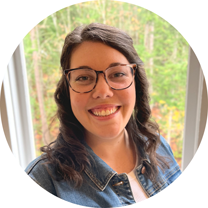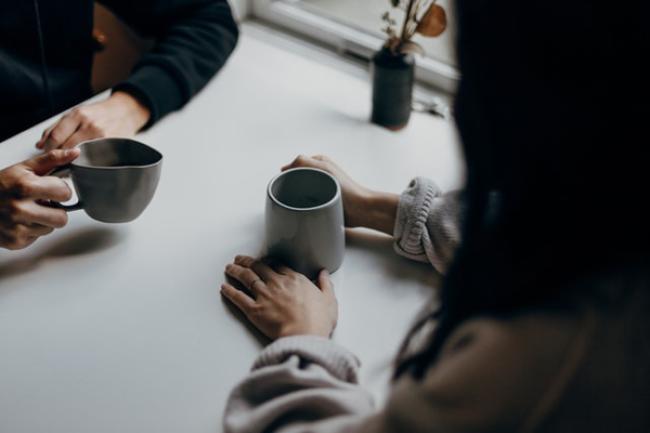Survivor Advocacy Services
Survivor Advocacy Services is a confidential resource for Western students who are experiencing or have experienced relationship (domestic, dating, intimate partner) violence or abuse, sexual violence, stalking, and/or sexual harassment.
Every person deserves to be safe in their relationships and sexual interactions, and to be treated with love, dignity, and respect. When someone experiences violence or abuse, they should be in control of the next steps, to be believed, and to be supported.
We are here to support you and help you heal from your experiences of violence/abuse. This service is for Western students. We affirm people of all identities and lived experiences. Please note, you do not have to identify yourself as a survivor or use the terms violence/abuse to describe your experience or in order to receive support.
If you are a concerned friend, partner, or family member of a Western student, support is also available for you.

Deidre Evans, MSW
WWU Survivor Advocate
360-650-7982
Deidre.Evans@wwu.edu
Call Deidre Evans Monday through Friday, 9 AM – 4 PM, at 360-650-7982, email her at Deidre.Evans@wwu.edu, or use our online scheduler to make an appointment.
If you reach voice mail, please leave a message with your name, phone number and/or email, preferred way of being contacted and specify if it is safe to leave a message.
Deidre will return your call as soon as possible, typically within 24 hours. If you call over the weekend, she will call you back the following Monday.
If you need to speak with a survivor advocate after hours or on the weekend, 24-hour support resources are available.
The WWU Survivor Advocate Will:
- Provide emotional support and help you to identify your current needs and goals for support.
- Talk through all available options.
- Inform you about processes and assist you in navigating the various systems you might be engaged in. Examples could include:
- Academic support
- Legal & Reporting options
- Medical needs
- Housing concerns
- Focus on survivor safety and safety planning with you.
- Connect you to support resources at Western and in the community, including support groups and therapy services.
- Talk with you about the dynamics and effects of violence and abuse while helping you to identify personal goals for healing and assist you in implementing coping skills and self-care practices.
Western’s Survivor Advocate, Deidre Evans, sees every survivor as the expert of their experiences. She works each day to create a space where students can share what they want about their experiences and for each person she works with, to feel supported in the next steps and goals that they set for themselves, their relationships, and their healing.
Advocacy services are confidential, survivor-driven/centered and trauma-informed.
Confidential

What you share with the survivor advocate is not shared with anyone else without your verbal and written consent. Speaking with the survivor advocate is not reporting to law enforcement or starting a reporting process with the University. There are a couple exceptions to what an advocate can guarantee will remain confidential, those exceptions and your rights to confidentiality will be discussed in your first contact.
Survivor-centered

Advocacy services focus on giving power and choice back to survivors of violence. Survivors are the one’s to make the choice to meet with an advocate , decide what they share with them, are in control of decision making and identifying personal goals. With the support of an advocate, survivors determine what safety, support and healing mean to them.
Trauma-informed

At the heart of trauma-informed care is the individual, because everyone follows their own path to healing. What is traumatic for one person may not be for another, so we start with where you are in your unique healing process. Instead of asking the question, “What is wrong with you,” we ask “What happened to you and how has this experience affected you?”
Reasons to Call a 24-Hour Helpline:
- You are not feeling safe in your relationship or your home. Advocates can help you think through a safety plan.
- To learn about options and resources and think through your next steps.
- To feel connected and supported.
- To talk to someone who understands the impacts of violence and abuse.
- To support a friend, family, or community member who is/has experienced violence.
Local 24-Hour Support
Domestic Violence and Sexual Assault Services
24-Hour Helpline: 1−877-715-1563
Advocacy counselors provide safety planning, emotional support, crisis intervention, and referrals through the helpline 24 hours a day, 365 days a year.
Lummi Victims of Crime
24-Hour Helpline: 360-312-2015
Provides culturally specific help for Native survivors and friends and family members who have been affected by domestic violence, sexual assault, elder abuse, assault and battery, survivor of homicide, child abuse, and sexual assault.
LGBTQ+ Support
NW Network
Note: This is not a 24-hour resource
Support available: Monday to Friday, 9am to 5pm. If you leave a message, they will get back to you as soon as they can.
Mental Health Support Lines
Crisis Text Line
Text HOME to 741741
Community Crisis Line
WWU Counseling and Wellness Center
Choose option 1 to connect with the on-call counselor after hours.
County-Specific Resources in Washington
National Resources
National Domestic Violence Hotline
Highly trained advocates are available 24/7/365 to talk confidentially with anyone experiencing domestic violence, seeking resources or information, or questioning unhealthy aspects of their relationship. Chat available.
StrongHearts Native Helpline
The StrongHearts Native Helpline is a safe, anonymous, and confidential domestic violence and dating violence helpline for Native Americans and Alaska Natives, offering culturally-appropriate support and advocacy.
Love Is Respect
- Speak to a peer advocate by calling 1-866-331-9474.
- Text LOVEIS (capitalization does not matter) to 22522
- Chat with a peer advocate by clicking on the “Chat Online Now” button at the top of the webpage.
RAINN National Sexual Assault Hotline
1-800-656-4673 (HOPE)
When you call 800.656.HOPE (4673), you’ll be routed to a local RAINN affiliate organization based on the first six digits of your phone number. Cell phone callers have the option to enter the ZIP code of their current location to more accurately locate the nearest sexual assault service provider.
Chat is also available online through their website.
National Deaf Domestic Violence Hotline
The National Deaf Domestic Violence Hotline (NDDVH) is available to Deaf callers across the nation, made possible through a partnership between the Abused Deaf Women's Advocacy Services (ADWAS) and the National Domestic Violence Hotline (NDVH).
Deaf NDDVH advocates at ADWAS answer videophone calls and emails 24/7. If using a voice phone, you will be connected to an interpreter during your phone call.
Is what I am experiencing/have experienced abuse or violence?
For some people it can be validating to review definitions, label their experience and identify as a survivor. For others these terms, labels and definitions do not resonate or aid in the healing process. Survivor Advocacy Services believes that you are the expert in your experience.
Intimate Partner Violence
Intimate partner (domestic, dating, relationship) violence is a pattern of behaviors used by one partner to gain and maintain power and control over another partner. Not all forms of intimate partner violence include physical violence but they all include power and control.
Do you:
-
Feel isolated from your support system because of your relationship?
- Worry about making decisions that will upset your partner?
- Feel afraid of your partner?
- Worry that your relationship is unhealthy or abusive?
Does your partner:
-
Criticize you, call you names, embarrass you with put downs
- Constantly call, text or track your location
- Try to control where you go, who you see, what you wear
- Make all of the decisions/wants to make all of the decisions in the relationship
- Invalidate your feelings and deny their behavior and abuse
- Try to limit your time with friends and family
- Guilt, coerce or force you into sexual acts
- Threaten to harm you or themselves if you leave them
If you have experienced any of the above behaviors or have questions about your relationship help and support is available. You do not deserve to be treated this way and can live a life free from abuse.
Sexual Violence
The term "sexual violence" is an all-encompassing, non-legal term that refers to crimes like sexual assault, rape, and sexual abuse. Learn more about types of sexual violence.
Sexual Assault
Sexual assault can take many different forms, but one thing remains the same: it’s never the victim’s fault.
The term sexual assault refers to sexual contact or behavior that occurs without explicit consent of the victim. Learn more about sexual assault.
If you have experienced sexual violence, assault, or feel harmed by a sexual experience, support is available. You do not need to remember everything that happened to reach out. You deserve a confidential space to receive support.
Survivor Support
There is not one way or right way to feel, cope or heal. Each person's experience, needs and process are unique and valid.
Below are some self care and coping resources that you can review and implement on your own. If you want to learn about more options or would like to speak with an advocate about how your experiences are impacting your daily life and create a plan for your specific needs, reach out to Survivor Advocacy Services.
Remember, healing and coping does not need to be your only priority or focus. You are deserving of doing the things and being around people that bring you joy, fun and connection and that is an incredible act of self care!
Self-Care
Grounding
Seeking support from a therapist can be helpful when you have experienced violence and trauma, particularly when the experience is impacting your daily life and relationships with others and yourself.
How can therapy help?
Depending on your current needs and goals the Survivor Advocate can help you in getting to connected to a therapist/counselor.
Support groups can be a powerful part of someone's healing process. Most often support group participants express that it is validating to be in a shared space, to be seen, to be heard, and to offer others support along the way. In this process of connection many find healing.
The Counseling and Wellness Center offers two confidential support groups for student survivors of violence. Learn more about our support group offerings.
DVSAS in Bellingham also offers free and confidential support groups to survivors.
Violence and abuse can happen to anyone and every survivor is deserving of help and support.
By providing confidential, survivor-driven, and trauma-informed advocacy, the WWU Survivor Advocate is trained to support all WWU student survivors.
We acknowledge that for many survivors it is important to receive culturally-appropriate and identity specific information, support and advocacy. Below is a complied list of 24-hour helplines, advocacy services, and online resources. Please note that not all of the resources are local to Bellingham and/or Washington State.
24-hour Helplines, Advocacy Services, and Online Resources
Strong Hearts Native 24/7 Helpline
Lummi Victims of Crime 24-Hour Helpline
Provides culturally specific help for Native survivors and friends and family members who have been affected by domestic violence, sexual assault, elder abuse, assault and battery, survivor of homicide, child abuse, and sexual assault. Call 360-312-2015.
Northwest Network: LGBTQ+ Survivor Support
Trans and Nonbinary Survivor Resources
Support for male identified survivors of sexual abuse
Chat available 24/7, plus weekly chat support group options.
Domestic violence agencies with a cultural focus in Washington state
If you are looking for other information or resources, Survivor Advocacy Services is here to answer questions and help you find the best option for you and your healing.
Personal Safety
Survivor Advocacy Services believes that safety and autonomy over one’s body and life are a fundamental human right. When you aren't feeling safe in your relationship(s), on campus, or at home, etc., you don't have to be alone. Talking with an advocate can be a helpful first step.
An advocate can help you think about ways to feel both physically and emotionally safer, on and off campus. It is important to note that safety does mean different things to different people and therefore everyone's safety planning process will be unique.
If you have a more immediate safety need you do have the option of connecting with law enforcement by dialing 911 and/or connecting to 24-hour resources to safety plan with an advocate.
You can also review these resources:
Legal and Reporting Options
A civil Protection Order can be an important part of some survivors safety planning process. Protection order options are based on the kind of violence and abuse someone has experienced. Please note that these options do use the legal definitions of domestic violence, sexual assault, stalking and harassment. If you want to learn more about these options and talk through the process , please connect with an advocate.
You can also review the information below:
Protection orders: Can the civil legal system help protect me?
Comparison of Court Orders: WA State
Off-campus Support with Protection Orders
Washington Law Help: File for a Protection Order
Washington Courts: Protection Order Forms
Whatcom County Assigned Counsel & Court Services: Protection Orders
Deciding to formally report an experience of violence, abuse and/or harassment is a deeply personal decision. Survivor Advocacy Services believes that only you should make the decision and that you deserve support throughout your decision making. Survivor advocates can talk through your reporting options and the process.
It is important to note that justice means different things to people and there are many reasons why a survivor may choose to report or not report, including personal safety.
The information below can be helpful to review:
The survivor advocate can confidentiality talk through this option, help you weigh the personal pros and cons to reporting and support you in the process of reporting to law enforcement and engaging in the criminal justice process.
Below is some general information about reporting to law enforcement:
WWU students who have experienced sexual assault, intimate partner violence and/or sexual harassment have the option to report to the Office for Civil Rights and Title IX Compliance (CRTC).
The survivor advocate can confidentiality talk through this option, help you weigh the personal pros and cons to reporting and support you in the process of reporting to CRTC.
The National Women's Law Center Survivors Speaking Out Toolkit was written by advocates and survivors, many of whom have spoken out about sex-based harassment and then faced defamation lawsuits and other retaliation. If you have faced sex-based harassment (including at school or work) and are thinking about speaking out about the harassment (or already have spoken out), this toolkit can help you understand your rights, risks, and options if you have faced sex-based harassment and are worried about retaliation, including a potential defamation lawsuit.
Medical
If you have experienced a sexual assault or physical violence, medical care may be an important next step.
Forensic Exam
One option is a sexual assault forensic exam. Sometimes referred to as a "rape kit." You do not have to have a forensic exam, but it is an option.
What is a forensic exam?
What Is a Sexual Assault Forensic Exam?
Where can I get a forensic exam in Bellingham?
Forensic exams are available at St. Joseph’s Medical Center by going to the emergency room.
Where can I get a forensic exam in other counties in Washington?
Visit the Washington State Resource for Sexual Assault Forensic Medical Care and select your county to view a list of locations.
Can an advocate be present with me for the exam?
Yes, advocates from DVSAS in Bellingham are available 24/7.
Other Options
If it is not an emergency need, you are not seeking a forensic exam, or you have follow up medical concerns, the Student Health Center can likely support you through their Sexual Health Services. If you have further questions about options and resources, connect with Survivor Advocacy Services.
Supporting Survivors
Most often survivors seek support from their friends, loved ones, and community first, before reaching out to formal support systems like an advocate, counselor, etc. Each of us can play in an important role in believing, validating and supporting those who are closest to us.
The resources below offer helpful tips:
WWU Ways to Support Survivors Guide
WSCADV Friends and Family Guide
RAINN Guide: How to Help Someone You Care About
If you are concerned for a loved ones safety, looking for information about resources and/or you need to talk through what you are hearing, Survivor Advocacy Services and 24- hour resources are also available to you as you support your community.
Each of us can play an important role in supporting survivors of violence. As a faculty and staff member at Western, you have the honor of being in a mentor role with many of the students and for that reason they may feel more comfortable disclosing their experiences to you vs a stranger. Visit our Ways You Can Support Survivors page for tips, or download our Supporting Survivors handout.
It is important to remember that, aside from designated confidential staff, all other Western employees are mandatory reporters. Sharing your limits to privacy is an important part of supporting student survivors, along with offering validation and resources.
"Western employees must promptly report known or suspected sexual harassment, sexual violence, or other discrimination based on sex to the Title IX Coordinator, even if the misconduct occurred off campus. This reporting requirement applies to all faculty and staff who are designated Responsible Employees."
If you have questions about mandatory reporting, connect with the Office for Civil Rights and Title IX compliance.
You are also welcome to reach out to Survivor Advocacy Services to discuss other options and resources for students you are supporting.
Healthy Relationships and Consent
The Counseling and Wellness Center offers outreach programs and special events on healthy relationships and consent. We often feature healthy relationships and consent content on our @bewellwwu Instagram account, including content created by our student volunteer Wellness Advocates, as well as through our weekly BeWellWWU newsletter. You can also learn more on our Healthy Relationships page or download our Consent Guidebook.
Confidentiality
A legal obligation to release information about you or your advocacy occurs when your advocate believes that you are at serious risk of harming yourself or someone else, when an advocate has reason to believe that abuse or neglect of a child or dependent adult may be occurring, or when a court of law compels a release of information by subpoena. Otherwise, information can be released only if you sign a form which authorizes a release and specifies what information is to be released.